ALSO BY ED SIKOV
ON SUNSET BOULEVARD:
THE LIFE AND TIMES OF BILLY WILDER
MR. STRANGELOVE:
A BIOGRAPHY OF PETER SELLERS
LAUGHING HYSTERICALLY:
AMERICAN SCREEN COMEDY OF THE 1950S
SCREWBALL: HOLLYWOODS MADCAP ROMANTIC COMEDIES
DARK
VICTORY
DARK
VICTORY
THE LIFE OF BETTE DAVIS
ED SIKOV
A HOLT PAPER BACK
HENRY HOLT AND COMPANY  NEW YORK
NEW YORK

Holt Paperbacks
Henry Holt and Company, LLC
Publishers since 1866
175 Fifth Avenue
New York, New York 10010
www.henryholt.com
A Holt Paperback and are  registered trademarks of Henry Holt and Company, LLC.
registered trademarks of Henry Holt and Company, LLC.
Copyright 2008 by Ed Sikov
All rights reserved.
Distributed in Canada by H. B. Fenn and Company Ltd.
Library of Congress Cataloging-in-Publication Data
ISBN-13: 978-0-8050-8863-2
ISBN-10: 0-8050-8863-2
Henry Holt books are available for special promotions and premiums.
For details contact: Director, Special Markets.
Originally published in hardcover in 2007 by Henry Holt and Company.
First Holt Paperbacks Edition 2008
Designed by Meryl Sussman Levavi
Printed in the United States of America
10 9 8 7 6 5 4 3 2 1
FOR CHRISTOPHER BRAM
P layers should be immortal, if their own wishes or ours could make them so; but they are not. They not only die like other people, but like other people they cease to be young, and are no longer themselves, even while living.... Their life is a voluntary dream; a studied madness. The height of their ambition is to be beside themselves.
W ILLIAM H AZLITT
(English literary critic, 17781830)
S he insisted that I see Hush... Hush, Sweet Charlotte with her. So she had a screening set upit was just the two of us. I was really more interested in watching her than the movie, and it didnt take much to do that because she talked all the way through it. And she kept talking about herself in the third person. She kept saying, Look at that dame up there on the screen! Isnt she great? She would criticize and compliment her performance, always in the third person, as if it were some other actress performing. I have no explanation for the psychological underpinnings of people who talk about themselves in the third person, but it has a regal ring, doesnt it? Shes great, shes fabulous, oh look what shes doing now! Its also kind of mad.
M ART C ROWLEY
(American playwright, 1935)
C ONTENTS
DARK
VICTORY
P ROLOGUE
A DARK, SQUARE-CUT MINK JACKET AND matching hat frames Bette Daviss face and neck, the fur lent an extra touch of sparkle by virtue of its glamorous silver tips. She is seated at a table at an elegant restauranta violin is playing in the distanceand she is angry. Its a seething, bitter anger, and so she is systematically getting drunk, having discovered in the previous scene two devastating pieces of information: she is dying, and, far worse, she has been lied to. She is talking to her two dinner companions, one of whom is her neurosurgeon and fianc, the other her best friendit is they who are the liarsand while shes not slurring her words exactly, neither is she not; theyre coming out as warm bursts of gin-scented mist.
Her friends, having arrived late enough to have missed the first few rounds of cocktails, are growing anxious and urge her to order some food, and she promptly obliges by yanking a menu out of a visibly startled waiters hand. Cut to a front-and-center medium shot. A martini glass sits prominently on a plate before her. The dark frosted fur surrounds her face. She looks righteous, dangerous, divine. And while the flat, white menu serves nominally as the focus of her gaze, its clear that shes putting on a performance of reading it. Bette Davis and her character, the equally willful Judith Traherne, have each been mentally drafting and redrafting the delivery of one of the greatest lines of their joint lifetime, and as they look up together in perfect superimposition, they fire it with precise aim and flawless timing: Well, II think Ill have a large order of prognosis negative!
Bettes enormous eyes widen even further at the end of the sentence. She glares off to the right and draws in a sharp intake of breath as a mark of emotional punctuation.
The film is Dark Victory, the year 1939. The director is Edmund Goulding, and the two other actors are George Brent and Geraldine Fitzgerald.
But the scene, and the film, belong to Bette Davis in the supreme and certain way that the Vatican and all of its paintings and sculptures and manuscripts and chapels and plazas belong absolutely to the Church. Daviss artistic possession of almost all of her films is just as incontrovertible (though the financial realm is precisely where the analogy fails). Goulding made some decent pictures, Fitzgerald was a proficient actress, Brent kept working... but Bette Davis was, and remains, as singular and commanding a figure as world cinema has ever produced.
She was a trained actress but a purely self-styled one. And her stylethe cinematic answer to the peaty pitch of a fine scotch or three, the smoke curls of cigarettes by the thousands, the effortless fashion in which a huge square-cut mink sits on her smallish shoulders, her peculiar way with breathing and vocal stressesthat style is what made Bette Davis.
She was magnificent and exasperating, luminous and bellicose in equal measure. Her longtime boss, Jack Warner, called her an explosive little broad with a sharp left. She was a force of nature, a blazing talent. She defined and sustained stardom for over half a century. She worked like a dog.
Pretty enough to be given the glamour treatment in her early twenties, she developed by middle age into weathered, thick-featured boniness graced by a slash of red lipstick. Later, when she was elderly, crippled by a stroke and weakened by breast cancer, she still compelled the world to look at her, just as she compelled herself to keep acting. Some stared, some cackled, and others no longer cared, but Bette Davis proudly remained a working actress until the day she died. Much more than family or friends or hobbies or, God forbid, idleness (as she would have snapped, Oh, brother!), acting was the only thing that really mattered in the end.
Imitating her vocal delivery and broadest physical gestures is actually quite easy as long as getting your audience to recognize who youre imitating is your goal. You snap the words out between your teeth and swiftly bite them off while holding an imaginary cigarette between the index and middle fingers and cranking the hand around by your waist in an inexplicable circular gesture, as though youre spinning a small wheel or turning a dial made of air. For longer lines of dialogue, you lay stresses eccentrically throughout the sentences and take breaths at odd places, all the while continuing to wave the cigarette around. The biggest laughs come from leaving off the last syllable of any sentence you choose, pausing for half a beat, and then bleating it in too high a tone.
With a minimal amount of practice and a taste for camp you can pull some laughs out of some of the stories in this book. But mimicking Bette Davis without reverence is (to revive the metaphor) like staring at the Sistine Chapel without awe.
Hollywood in the 1930s is unthinkable without Mildred Rogers, Daviss scenery-chewing harridan in


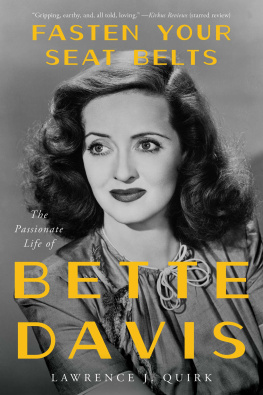
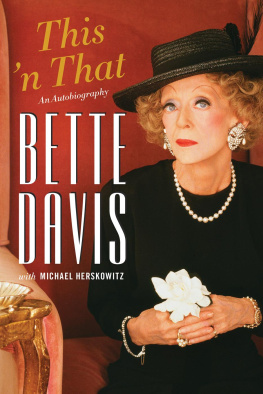
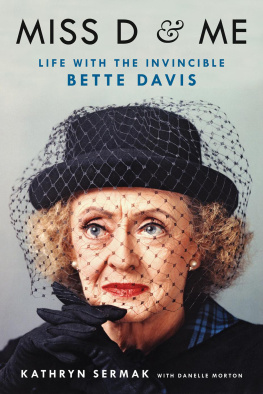
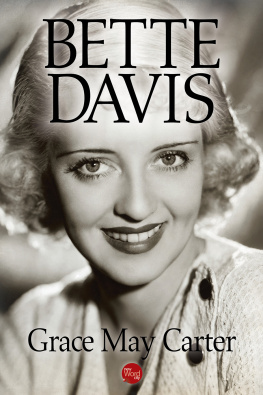
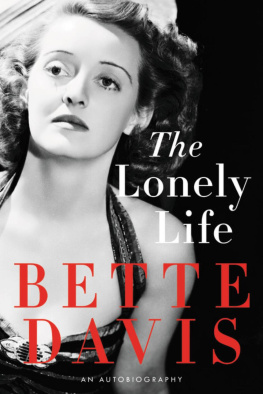
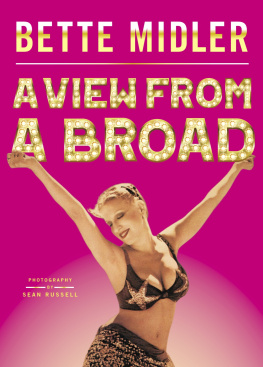
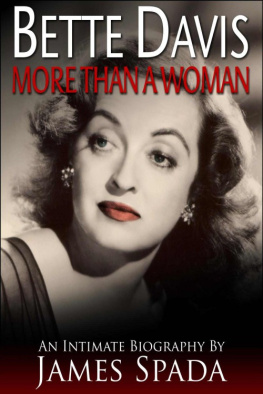
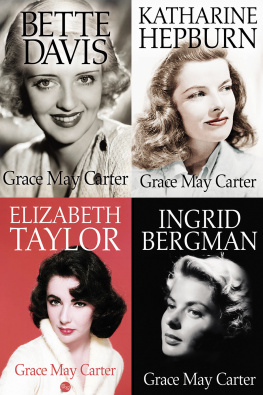
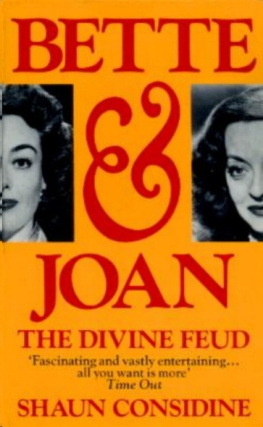
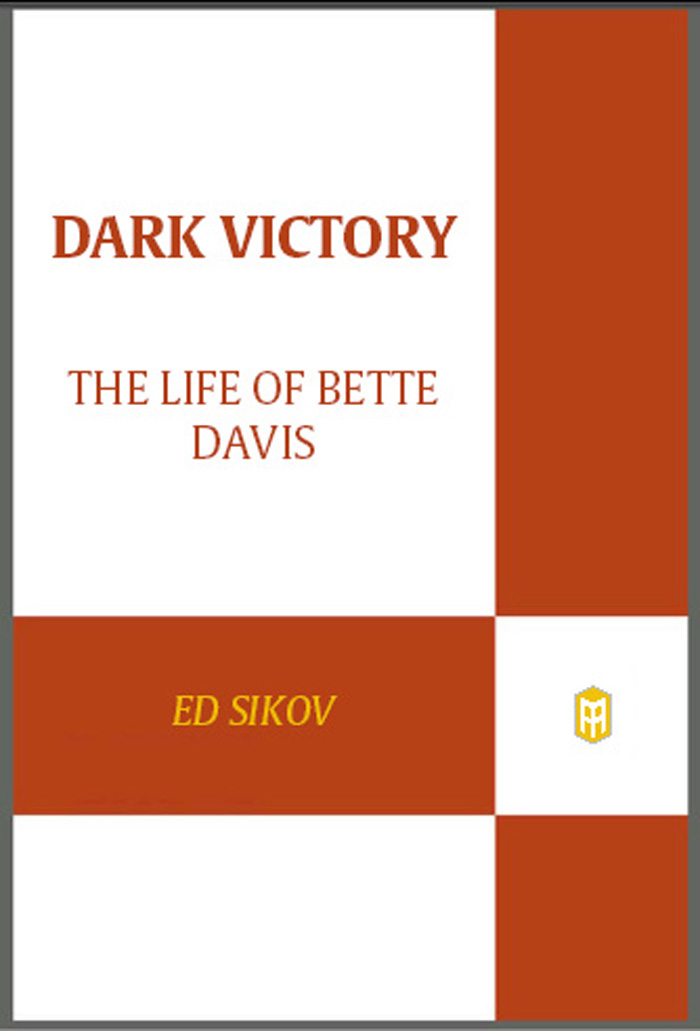
 NEW YORK
NEW YORK
 registered trademarks of Henry Holt and Company, LLC.
registered trademarks of Henry Holt and Company, LLC.